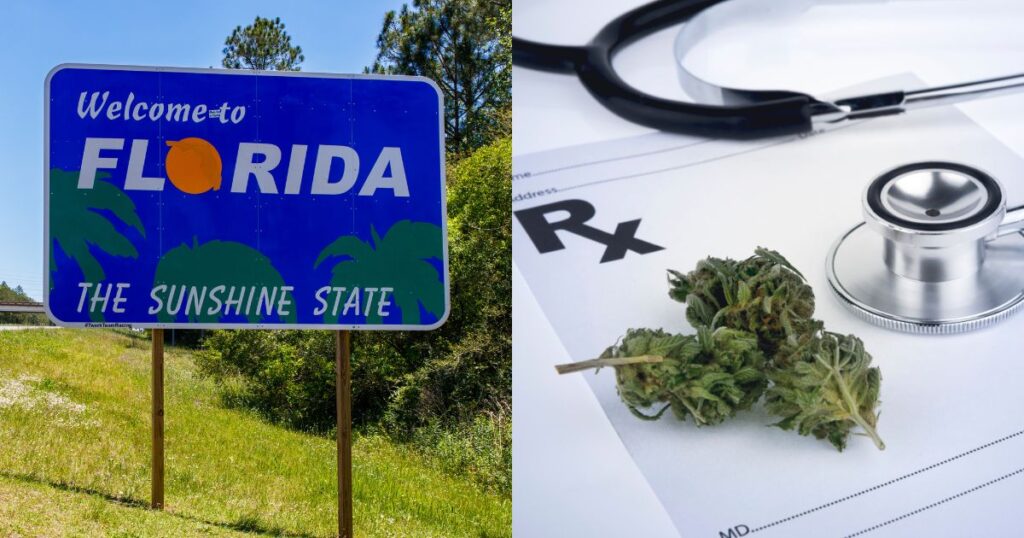Florida’s medical marijuana program faces a significant threat under a new state law that targets patients with drug-related criminal histories. Senate Bill 2514, signed into law by Governor Ron DeSantis at the end of June, grants the Florida Department of Health sweeping authority to revoke medical marijuana registrations from patients and caregivers who face drug charges or have past convictions.
The legislation represents a troubling shift in how Florida treats medical marijuana patients, particularly those whose only “crime” may have been using cannabis before it became legal medicine in the state.
This new law creates a two-tiered system where patients’ access to legally prescribed medicine can be stripped away based on their past—even when that past involved substances that are now considered legitimate medical treatments.
How the New Law Effects Florida Medical Marijuana Patients
Under SB 2514, the Florida Department of Health must immediately suspend medical marijuana registrations for any patient or caregiver who is simply charged with a drug crime.
This suspension remains in effect until the criminal case reaches its final resolution, meaning patients could lose access to their medicine for months or even years while awaiting trial.
The law becomes even more punitive after conviction. The Department of Health must permanently revoke registrations when a patient or caregiver is convicted of, or pleads guilty or no contest to, drug trafficking, selling, manufacturing, delivering, or possessing controlled substances with intent to distribute. This applies regardless of whether the court withholds adjudication.
While patients can theoretically seek reinstatement by filing a new application with a notarized statement confirming they’ve completed all terms of incarceration, probation, or supervision, this process creates additional barriers for people seeking medical treatment.
The law also makes it a second-degree misdemeanor to provide false information in these attestations, adding another layer of potential criminal liability.
Targeting the Wrong People
The most troubling aspect of this legislation is how it appears designed to target patients with pre-legalization drug convictions rather than addressing any real problems within Florida’s medical marijuana program.
Most medical marijuana patients stay within legal possession limits, which the state clearly defines and monitors through its tracking system.
Instead, this law appears designed to target individuals convicted of drug crimes before Florida legalized medical marijuana.
These are people who may have used cannabis for medical purposes years ago when it was still illegal or faced consequences from the failed war on drugs for relatively minor offenses.
The timing and structure of the law suggest this isn’t about protecting program integrity—it’s about excluding certain groups from accessing medicine based on their past interactions with the criminal justice system. This represents a fundamental misunderstanding of both addiction and medical need.
The Injustice of Denying Medicine
Every patient deserves access to medicine, regardless of their past actions, especially when those actions involved substances now recognized as valid medical treatments.
The science surrounding cannabis as medicine has evolved dramatically over the past decade, and with Florida having its own medical marijuana program acknowledges its therapeutic value for numerous conditions.
Many patients affected by this law likely self-medicated with cannabis before legalization or used other substances to manage pain, anxiety, or other conditions that medical marijuana can now address legally and safely.
Punishing these individuals by denying them access to legal medicine creates a cruel irony where past criminalization becomes a barrier to current medical treatment.
Consider a patient convicted of marijuana possession five years ago while managing chronic pain, or an individual recovering from addiction who could now benefit from medical cannabis for legitimate health conditions.
Under this new law, their past becomes a permanent obstacle to accessing medicine that could improve their quality of life.
A Misguided Approach to Drug Policy
This legislation reflects outdated thinking about drug policy and medical treatment. Modern approaches to drug policy recognize that addiction is a health issue, not a moral failing, and that past criminal justice involvement shouldn’t be a barrier to accessing medical care.
The law also overlooks the fact that many substances once heavily criminalized now have recognized medical uses.
Cannabis itself is the perfect example of this evolution, but the same principle applies to other substances that researchers are now studying for their therapeutic potential.
By creating permanent barriers to medical marijuana access based on past drug convictions, Florida is essentially saying that some patients are undeserving of medicine because of their history.
This contradicts evidence-based medicine and creates a system where access to treatment depends on criminal justice history rather than medical need.
Change is Needed For Medical Marijuana Program in Florida
This law doesn’t exist in a vacuum. It’s part of a broader pattern of restrictions on Florida’s medical marijuana program under Governor DeSantis’s administration.
The governor has consistently opposed marijuana policy reforms, including adult-use legalization, and has used his position to limit access to medical cannabis.
The legislation comes at a time when other states are moving toward more inclusive drug policies, including expungement programs for past marijuana convictions and recognition that criminal justice involvement shouldn’t be a barrier to medical treatment.
Florida’s approach moves in the opposite direction, creating new barriers and punishments for vulnerable populations.
This backward movement is particularly troubling given the opioid crisis and growing recognition that medical marijuana can serve as a safer alternative to potentially addictive pain medications.
By restricting access to medical cannabis based on past drug convictions, Florida may be pushing some patients back toward more dangerous substances.
Doctors and patients should decide on medical marijuana access, not prosecutors or past convictions. Florida has an opportunity to lead on progressive drug policy, but laws like SB 2514 move the state in the wrong direction.
The medical marijuana program exists to help patients, not to punish people for past mistakes. It’s time for Florida to remember that medicine should be available to all who need it, regardless of their history with the criminal justice system.

















